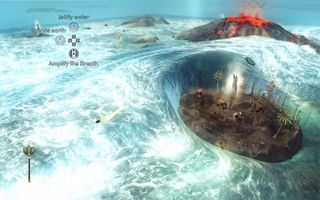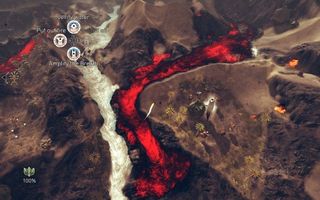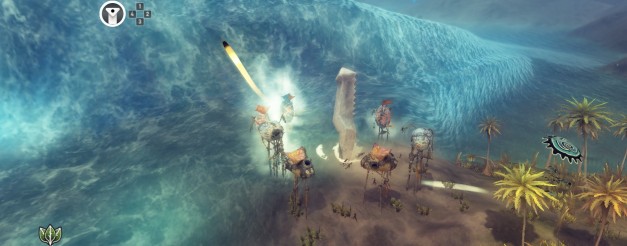Our Verdict
A gorgeous and rich land-sculpting simulation thats lovely to tinker with, but often buggy and stressful to play.
PC Gamer's got your back
From Dust is singleplayer only, but its copy protection requires you to be online at all times – if you're disconnected, the game pauses and won't let you save. I'm telling you this now because it's ridiculous, and so I can move on to talking about the game.
Update: Re-tested, and this has changed since this review was written - the game no longer kicks you out if your connection is lost. You do need to be online to start the game, though. (Thanks John ).
I've never played anything quite like it. It's a game about sculpting landscape by sucking up swirls of lava, water and earth and trickling them into rivers and ridges to protect your masked tribe. It's extraordinary, exhausting, spectacular, and frequently no fun at all.
The terraforming is smooth and organic: lava oozes and hardens, water sloshes, dust settles into soft dunes. What you're doing with it isn't: you need a perfect wall of rock to stop that tidal wave. That tension, between the hard rules of your objectives and the soft physics of nature, is a big part of the challenge.

It can be hard, time-consuming and repetitive work, but it is compulsive. It taps into an instinctive fascination with how the world behaves, and the pleasure of tinkering with a rich simulation. A simulation rich enough that you can actually see the game's sediment physics form river deltas.
When it stops being fun is when that hard graft is undone by glitches, limited control, and trial-and-error level design.
The glitches are mostly with your tribe. The game is about holding the elements at bay long enough for your people to establish towns and protect them with spells. When you manage to give them that chance, however, they frequently lose interest and stand around staring at their feet.

You don't control them directly, so when the AI bugs out and forgets what it's supposed to be doing, there's often no way to correct it. It's a special kind of sadness to have to drown some of your brain-crashed people just to make the others realise they needed to send more.
In a relaxed, playful sandbox game, that kind of lapse would be minor. But weirdly, most of From Dust's missions are frantic nightmares of crisis management. Floods, fires and volcanic eruptions impose recurring time limits in which to get things done. So when your people get lost or distracted, it's always a disaster.
When your people do behave, they're adorable. They build huts on huge stilts, and honk out acid jazz on their didgeridoos to repel water from their homes. Seeing a tidal wave roar around a town's invisible jazz barrier is a deep and unique happiness.

The levels are mesmerising: angry cauldrons of lava, gentle starlit dunes, heat-blackened rocks alone in a storming sea, orange and blue ferns crawling with oversized trilobites. You transform these places as you play, diverting rivers of molten rock to clash with streams of water, splashing dry dust to raise plant life, even dropping hot gobs of lava into the sea to forge new lands with an angry hiss.
This can backfire. When a level seems impossible, you're never sure if you're missing something or if you've messed it up beyond repair. Scripted events can conflict with your work in ways that you never recover from, and lead to unforeseeable failures.
Between that and the absentminded villagers, you can spend more of your time wrestling against From Dust's usability problems then the elements. Thank God it's fresh, beautiful and fascinating enough to be worth it.
A gorgeous and rich land-sculpting simulation thats lovely to tinker with, but often buggy and stressful to play.

Blades of Fire just showed off its first five minutes of gameplay, and I think it might be channelling God of War too heavily

Vampire survival RPG V Rising gets a big update next month, bringing a new biome, multiplayer duels and the 'biggest combat overhaul yet'

The modder who added seamless coop to Elden Ring and Dark Souls 3 is now doing the same with Dark Souls: Remastered











